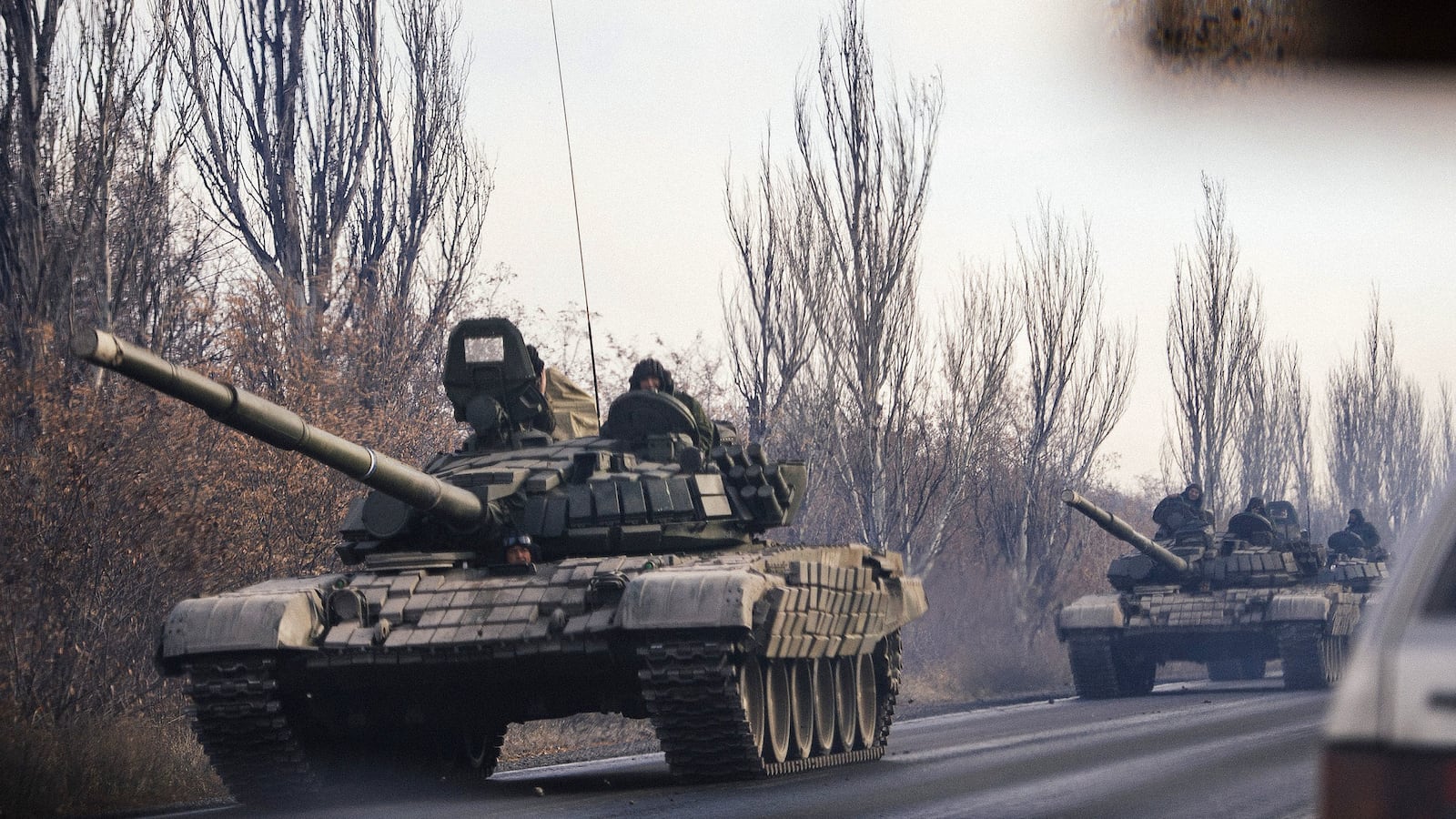Winter is coming in Ukraine. For people living in basements and in half-ruined buildings in the east of the country, and for the soldiers on both sides, the slow-motion war of the spring and summer has given way to a constant freezing ordeal night and day. Donetsk, the city at the center of the conflict between pro-Russian rebels and the pro-European government in Kiev, is said to be on the verge of a humanitarian catastrophe.
But the fighting continues, and grows worse, despite a nominal ceasefire. And the onslaught of the elements has helped raise tensions to the point where a new explosion is expected any day. With the coming of winter, the Russians have come as well, as Moscow appears to be intent on shoring up the positions of its allies, while deterring any effort by Kiev to retake lost ground.
Observers from the Organization for Security and Cooperation in Europe as well as Ukrainian officials expressed concerns about heavy military equipment supplied by the Russian Federation to the rebels, including tanks and ground-to-air missile systems.
On Monday, Ukraine Defense Ministry Spokesman Andry Lysenko reported that rebels now had the Russian-produced Pantsir anti-aircraft missile system (called the Greyhound SA-22 by NATO) positioned just 500 meters from a rebel checkpoint outside of Novoazovsk. “We stress that such a system, even in theory, is not part of armament of the Armed Forces of Ukraine,” said Lysenko.
The context is one that everyone in Kiev and Moscow understands: Last summer a Russian-made missile blasted a civilian airliner, Malaysia Airlines MH17, out of the sky over the Ukraine war zone. Everyone aboard was killed. Although most evidence points to the tragedy as an accident by a rebel missile unit, Moscow continues to try to pin the blame on Kiev.
Meanwhile, the local Chas Pik Internet news site posted video footage of what are believed to be Russian tanks arriving to support the rebels in Donetsk. Local reports said that dozens of military vehicles and mobile howitzer artillery arrived in Donetsk on Monday, and there seems to be little inclination to disguise the fact in Moscow.
“I admit that without Russian multi-layered support, Donbass [the eastern Ukraine region] would have never handled aggression by the Ukrainian army,” says Sergei Markov at a pro-Kremlin think tank close to Russian President Vladimir Putin.
Markov tells The Daily Beast he expects the situation in eastern Ukraine to explode in the coming two days. He blames Ukrainian officials for violating the ceasefire agreement and shelling the outskirts of Donetsk city.
“Novorossia soldiers would not initiate the battle,” says Markov, “but I believe their plan is to gradually take control over Piski, Avdiivka, and Schastye, a town with a central heating station.” Markov also added that rebels might make an attempt to take back control of their former strongholds in Sloviansk and Kramotorsk, “symbolically and strategically important towns for them.”
On Monday, Donetsk rebel leader Alexander Zakharchenko declared there would be no exchange of military prisoners with Ukrainian side until next round of peace negotiations in Minsk, which rebels hoped to have with Ukrainian officials in late November.
Meanwhile, every day the ceasefire death toll mounts. On Monday, Ukrainian authorities reported attacks on their military forces by rebel mortar batteries in Debaltseve, in the Donetsk region and in Orlovske and Hranitne, in the Mariupol region. Two Ukrainian servicemen were reported killed and five wounded.
In eastern Ukraine, three more people were killed and seven wounded by rebel shelling in the residential area of Avdiivka, AFP reported Monday. In the last four months, more than 4,000 civilians fell victim to the violence. The Ukrainian security service, the SBU, reported 1,700 people went missing during that time.
On Nov. 5, shells killed two children and wounded several people on a school playng field in Donetsk. The OSCE could not tell who fired at the school, Ukrainian or rebel forces. Last week, a Russian doctor Yelizaveta Glinka, known as Doctor Liza, helped to evacuate nine wounded children from Donbass to Moscow; 50 more children needed urgent medical help, the doctor told The Daily Beast. And the depths of winter are still to come.






